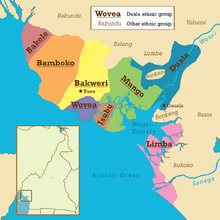Pongo is a dialect of the Duala language, spoken on the coast of Cameroon, in the district of Dibombari, by the Pongo tribe. It belongs to the Bantu languages, Code A26 according to Guthrie classification.[1][2]
Description
The Pongo language is, according to dialectometrics data, closest to the Douala standard, with which it seems to share nearly 95% of its basic vocabulary.[3] Both languages are mutually intelligible despite some difficulties on the Douala side due to limited exposure to the Pongo dialect. The Douala dialect is used as a lingua franca in the Littoral region between members of the Sawabantu ethnic group. The standard Douala has been used to evangelize in the region and is the preferred language of the Makossa musical genre.
Geography
The town of Dibombari is the centre of Pongo. This area is located north of the city of Douala, above the Bonabéri district. The term "Pongo" is also used to designate the north cardinal point in Douala.[4] There, the Pongo tribe coexists with other ethnic groups such as the Bankon and the Mpoo.

Grammar
Pongo differs from Duala in the use of the verb èndè instead of the verb wala (to go), unusual in Douala, which serves as an auxiliary verb in the future tense in both languages. Another noticeable difference is the use of the conjunction ndi ("but") instead of ndé and a tendency to favor the phoneme / d / over / l /. For example: Ekwali, written Ekwadi ("History") in Douala, becomes systematically Ekwadi in Pongo. In addition, the Douala prefix ma, usually placed before the basic form of the verb, is replaced by an n', in Pongo. An example is the Douala sentence "di ma topo, ndé ba bato si ma senga", which becomes in Pongo "di n'topo Di , ndi ba bato n'senga" "we talk, but people do not listen."
Vocabulary
Comparative glossary of Douala and Pongo dialects. Boxes with two words indicate that these words are both present in the dialect and that they are interchangeable.
| Pongo Word | Douala Word | English Translation |
|---|---|---|
| Dinga | Linga, dinga | to get mad |
| moopo, mulopo | mulopo | head |
| ilèndi | diwèndi | knife |
| ikom (plural:lokom), dikom | dikom (plural, makom) | friend(s) |
| budu | bulu, budu | night |
| djibö | don | Market |
| djibö | dibö | beach |
| mudjodi (plural : midjodi) | mudongo (plural : midongo) | hill, mountain |
| eka, enka | nika, ninka | thus, this way |
| mwato (plural : baato) | muto (pluriel : bito) | Woman |
| sèkibanè | sèkèméyè | to shake something |
| ilodi | idodi | Filariasis |
| mwéma | mulema | heart |
| mö | mö |
him, her |
| yö | mö | it |
| ëndë, wala |
wala | to go |
| mpèlè | mpöm | uniqueness |
| na bodi | na boli, na bodi | I did |
| ndi, nde | nde | but |
| yöngö (pluriel : löngö) | wöngö (pluriel : löngö) | pot |
References
- ^ "NUGL Online: The online version of the New Updated Guthrie List, a referential classification of the Bantu languages" (PDF). 2009. Archived from the original (PDF) on 2013-06-07.
- ^ "Isubu/Wovia media". Documentation de Langues en danger. Nijmegen (Netherlands): The Language Archive (TLA), Max Planck Institute for Psycholinguistics.
- ^ Carl, Ebobisse (1989). "Dialectometrie Lexicale des parlers sawabantu". Journal of West African Languages.
- ^ Helmlinger, Paul. Dictionnaire Duala-Français Suivi d'un Lexique Français-Duala.
